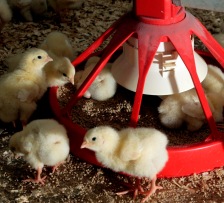Zinc complexes improve feed conversion

Dietary zinc stimulates immunity and supports skeletal development, feathering and skin strength, etc. In addition, feeding highly bioavailable sources of zinc, such as zinc complexes, to broilers also shows improvements in gain and feed conversion.
By Wiebe van der Sluis
Zinc is an essential trace element in all living systems from bacteria, plants and animals to humans. Its biological function was not understood until 1934. It took another 20 years before naturally occurring zinc deficiency was recognised as the cause of parakeratotic (hardening and cracking) lesions of the skin of pigs, and slow growth, poor feathering and abnormal skeletal development in poultry. Recent poultry literature suggests zinc deficiency in poultry is associated with footpad lesions and poor carcass quality due to scratches and skin damage. This made poultry producers and nutritionists realise that adequate dietary zinc supplementation is critical in poultry production.
Bioavailability of zinc
Zinc is primarily absorbed in the small intestine. However, it is known that binding form and other dietary ingredients can influence the bioavailability of zinc. In monogastric animals, phytate, for example, decreases zinc absorption. Dietary calcium, magnesium, phosphorus, nickel, copper and iron also affect zinc bioavailability.
Zinc is primarily absorbed in the small intestine. However, it is known that binding form and other dietary ingredients can influence the bioavailability of zinc. In monogastric animals, phytate, for example, decreases zinc absorption. Dietary calcium, magnesium, phosphorus, nickel, copper and iron also affect zinc bioavailability.
There are differences in bioavailability between various zinc sources. Most of them are quite low, for example: the absolute bioavailability for zinc oxide is 22%, for zinc sulphate 23% and for zinc acetate 19%. It is also true that the relative biological value of zinc sources varies (Table 1).
Growth promotion effects
Because of the low zinc content in some feed ingredients with varying levels of bioavailability, it is necessary to add zinc to poultry diets. In the European Union, zinc diet contents are allowed up to 150 mg/kg feed. These levels cover largely the recommended requirements for most animals, especially when highly bioavailable zinc complexes are supplemented. When feeding zinc complexes within these legal limits, it helps decrease the severity of footpad and skin lesions, as well as improve feathering condition and skeletal development.
Because of the low zinc content in some feed ingredients with varying levels of bioavailability, it is necessary to add zinc to poultry diets. In the European Union, zinc diet contents are allowed up to 150 mg/kg feed. These levels cover largely the recommended requirements for most animals, especially when highly bioavailable zinc complexes are supplemented. When feeding zinc complexes within these legal limits, it helps decrease the severity of footpad and skin lesions, as well as improve feathering condition and skeletal development.
Since zinc also stimulates the development of the immune system, providing sufficient bioavailable zinc results in healthier birds.
Trials conducted in various parts of the world clearly indicate that zinc complexes have a positive effect on body weight and feed conversion in broilers, as well as egg production and shell quality in laying hens. These effects are more notable during heat stress.
Improved performance
Recently, researchers at Auburn University, Alabama, USA, investigated the influence of zinc complexes on live performance and carcass grade of broilers. They reported that feed conversion was improved for female broilers fed Zn complexes at 25 and 42 d of age and male broilers at 21 d of age.
Recently, researchers at Auburn University, Alabama, USA, investigated the influence of zinc complexes on live performance and carcass grade of broilers. They reported that feed conversion was improved for female broilers fed Zn complexes at 25 and 42 d of age and male broilers at 21 d of age.
In a follow up study, the same group showed (in a trial with 1440 male Ross broilers over 49 days) a feed:gain of 1.701 versus 1.736 for broilers fed zinc complexes and ordinary sulphate, respectively (Figure 1).
A summary of 22 trials from Zinpro Corporation showed that feeding broilers zinc complexes improved the feed efficiency by 3.9 points (0.039 or a 2% improvement) when weights were equalised to those of the sulphate control. This feed efficiency advantage continued to persist even when broilers were reared to heavier weights (>3.4 kg). These results show that providing sufficient zinc complexes helps to improve bird performance.
Some zinc facts • Zinc is needed for immunity, cell division, cell growth, wound healing, and carbohydrate metabolism. • Zinc is also needed for the senses of smell and taste. • Zinc from plant sources is not as available for use by the body as the zinc from animal sources. Therefore, low-protein and vegetarian diets tend to be low in zinc. |













